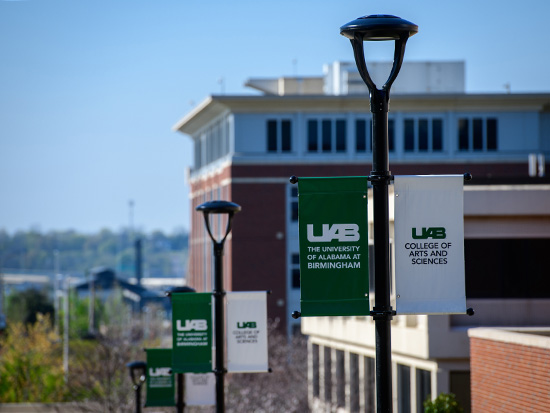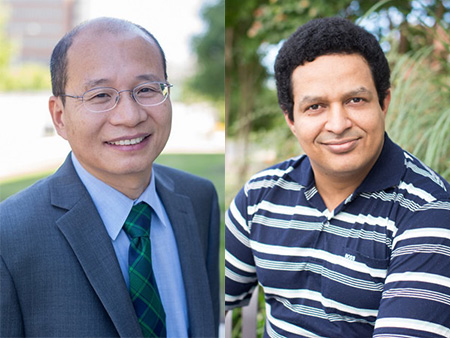 The College of Arts and Sciences at the University of Alabama at Birmingham has been awarded a Scholarship for Service grant renewal worth $4.6 million from the National Science Foundation to further cybersecurity workforce development programs.
The College of Arts and Sciences at the University of Alabama at Birmingham has been awarded a Scholarship for Service grant renewal worth $4.6 million from the National Science Foundation to further cybersecurity workforce development programs.
“This renewal grant is the largest grant our department has received, which shows NSF’s trust in our vision to educate and train a world-class, diverse group of students who are ready to address real-world computer security and artificial intelligence challenges,” said Yuliang Zhang, Ph.D., professor and department chair of the UAB Department of Computer Science. “This grant is a renewal of the previous grant we received in 2017; but it is double in amount this time, which truly speaks to our commitment to preparing the best professionals who meet the ever-changing needs of the industry.”
This expansion of funds by NSF is aimed at addressing the growing need for a well-trained national cybersecurity workforce that is equipped to deal with artificial intelligence and machine learning and their spread –– an important aspect of the White House’s Cybersecurity strategy implementation plan.
“Cybersecurity is critical to our nation’s economic and national security,” said NSF Director Sethuraman Panchanathan. “Through this program, NSF has helped more than 4,500 students get the degrees they need to be part of the cybersecurity workforce and helped them give back through public service. With this announcement, NSF reaffirms its commitment to invest in institutions that have demonstrated exceptional success and innovative advancements to their existing projects with the aim of fostering a robust workforce and growing interest in cybersecurity careers.”
"This significant award is another example of the excellent work and national reputation of the integrative science community in the UAB College of Arts and Sciences. Our strengths in cybersecurity, AI/machine learning and data science will be utilized to accelerate interdisciplinary research while developing a new, diverse generation of future focused scientists." – Kecia Thomas, Ph.D., dean, College of Arts and Sciences
At UAB, the grant will support the following programs:
-
Cyber Corps: Scholarship for Service, which addresses the growing threat to the nation’s information technology infrastructure by supporting the recruitment and training of the next generation of cybersecurity and information assurance professionals.
-
Bridge to Cybersecurity, a two-semester program that will improve the access of underprivileged, marginalized populations, as well as non-computer science students and graduates, to pivot to cybersecurity by teaching them the basics of computer science.
With the grant, scholarships will be awarded to students to enroll in any of three master’s programs offered by the Department of Computer Science, including the Cyber Security master’s program, which was named the No. 1 Master’s in Cyber Security Program in the nation by Fortune Magazine. The Cyber Security program is a unique partnership between Computer Science and Criminal Justice at UAB with a goal to train the next generation of cybersecurity and information assurance professionals. A total of 32 students will be selected over the course of this five-year grant.
 Yuliang Zheng, Ph.D., and Ragib Hasan, Ph.D.The scholarships will provide academic year stipends to cover expenses including tuition and education-related fees, health insurance reimbursement allowance, professional development allowance, and book allowance. All scholarship recipients are required to complete an internship and work for a federal, state, local or tribal government organization in a position related to cybersecurity for a period equal to the length of the scholarship after graduation, accomplishing the grant’s mission.
Yuliang Zheng, Ph.D., and Ragib Hasan, Ph.D.The scholarships will provide academic year stipends to cover expenses including tuition and education-related fees, health insurance reimbursement allowance, professional development allowance, and book allowance. All scholarship recipients are required to complete an internship and work for a federal, state, local or tribal government organization in a position related to cybersecurity for a period equal to the length of the scholarship after graduation, accomplishing the grant’s mission.
“The renewal grant is a testament to our commitment to quality education and increasing the pipeline of the cybersecurity workforce,” said Ragib Hasan, Ph.D., professor of computer science and the principal investigator of the grant. “The grant will continue to support the education, recruitment and career-readiness of future cybersecurity professionals. Our goal is to prepare students for a robust and inclusive cybersecurity landscape that can meet the evolving challenges of our digital age through practical experiences and professional development opportunities, facilitating their transition into cybersecurity careers.”